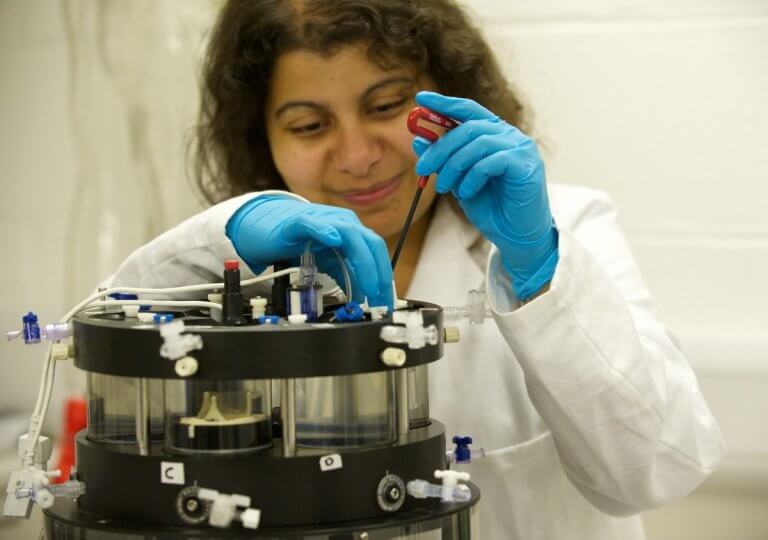
Biomedical engineering is geared towards improving healthcare and quality of life, seamlessly integrating engineering with medical needs. As a truly interdisciplinary field, you’ll learn the mechanics of biology, anatomy, physics and, of course, engineering.
By specialising in prosthetics and orthotics, you’ll be responsible for restoring use of limbs in people who have suffered amputations or deformities, enabling manoeuvrability and independence that would otherwise be impossible without biomedical engineers.
The Department of Biomedical Engineering at the University of Strathclyde offers those who are passionate about improving the lives of patients a directed route into prosthetics and orthotics, presenting a range of courses at undergraduate and postgraduate level.
Once only reserved for postgraduates, this department demonstrates teaching and research excellence, welcoming thousands of students in the past 50 years. Now ranked number one for medical technology by The Complete University Rankings 2019 in the UK, the University of Strathclyde is a leading institution to kick-start your biomedical career.
The Bachelor’s of Science in Prosthetics and Orthotics prepares ambitious undergraduates for a career in the field, covering everything from physical mechanics to human biology.
To enter the prosthetics and orthotics profession, you must have a degree that’s approved by the Health and Care Professions Council.
As one of only two universities in the UK to hold this accreditation, as well as the only to receive category 1 accreditation from the International Society for Prosthetics and Orthotics, Strathclyde offers a fast-track into the industry with international recognition to take your degree further.
You’ll also be immersed in the real-world working environment of prosthetics and orthotics alongside your studies. From working with patients during clinical placements to developing prosthetic and orthotic limbs in the workshop, students implement classroom theory in a real medical setting, also developing patient care skills and making a difference in lives from the beginning of their medical career.
“Seventy percent of the time, we’re hands on; casting patients, doing modifications on the mould, being in the workshop,” says Nigel Wong Yong Jie, a current BSc Prosthetics and Orthotics student at Strathclyde.
In time not spent on the ward or in the workshop, students get to enjoy Scotland’s biggest city both in terms of population and culture. Glasgow is home to 1.5 million people and recognised as a UNESCO city of music, making it an exciting place to complete your studies while gaining key exposure to biomedical practices.
The industry experience offered by the department will prove invaluable to you beyond your studies, ensuring you have the key skills needed to hit the ground running upon graduation.
If you’ve already graduated and are keen to deepen your knowledge or specialise in prosthetics and orthotics, the department offers two programmes in the discipline, helping you reach your ultimate career goals.

Source: University of Strathclyde, Faculty of Biomedical Engineering
The MSc Prosthetic and Orthotics course offers Master’s-level clinical experience in the area, on top of delving into the effects of disability and analysing societal approaches through a global lens.
Students are led through a rigorous programme of taught classes, laboratory demonstrations, practical exercises and clinical visits before undertaking work placements and a major project on a chosen topic.
The degree is designed to cultivate the analytical skills needed to drive the industry forward through research and clinical impact.
For professionals already working within prosthetics and orthotics, the Prosthetics and Orthotics Rehabilitation course at the Master’s, Postgraduate Diploma or Postgraduate Certification level grants you the flexibility to enhance your career in a programme that fits around you.
“The MSc programme has been challenging and rewarding. The combined emphasis on research, engineering, and entrepreneurship has provided me with the skills to succeed in my planned career as a clinician and biomedical engineer. Coming from Canada, studying in Glasgow has been an exciting and enriching experience,” says Reniel Engelbrecht, MSc Biomedical Engineering student.
As Engelbrecht mentions, the Department of Biomedical Engineering prides itself on its entrepreneurial spirit, academic excellence and industry focus.
In fact, research in the department recently led to a breakthrough in biomedical products on the market. Hemosep, a product developed by the Department’s Professor Terry Gourlay, is used to clean blood lost during operations, which enables that same blood to be given back to the patient, while other developments are gaining military attention.
Limb salvage technology, investigated by the department, is now being recognised for its military potential, since limb injuries are the most common consequences of combat, often leading to limb amputation.
Biomedical technology implemented on the battlefield reduces the need of amputation, isolating the limb with a dual position-variable tourniquet and cooling sock which extendedly preserves the limb, as well as perfusion technology that supports the metabolic and circulatory needs of the isolated limb, maintaining tissue viability post-injury.
These industry developments illustrate the forward-thinking, innovative culture that thrives in the University of Strathclyde’s Department of Biomedical Engineering. Here, students and researchers make progress in the field, both on a personal and industry-wide scale.
If you’re keen to gain an industry-focused education in Biomedical Engineering at an ambitious and growing university, you can find more information here.
Follow the University of Strathclyde on Facebook, Twitter, YouTube, Google+ and Instagram
Liked this? Then you’ll love…
Engineering your success: 4 Schools that will get you to the top
Engineer a brighter future through research at Northeastern University







